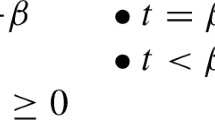Abstract
One way to obtain a comprehensive semantics for various systems of modal logic is to use a general notion of non-normal world. In the present article, a general notion of modal system is considered together with a semantic framework provided by such a general notion of non-normal world. Methodologically, the main purpose of this paper is to provide a logical framework for the study of various modalities, notably prepositional attitudes. Some specific systems are studied together with semantics using non-normal worlds of different kinds.
Similar content being viewed by others
References
J. Barwise, Absolute Logics and 64-01, Annals of Mathematical Logic 4 (1972), pp. 309–342.
—, Axioms for Abstract Model Theory, Annals of Mathematical Logic 7 (1974), pp. 221–265.
J. Bell and M. Machover, A Course in Mathematical Logic, North-Holland, Amsterdam, 1977.
C. C. Chang and H. J. Keisler, Model Theory, North-Holland, Amsterdam, 1973.
S. Feferman, Two Notes on Abstract Model Theory I, Fundamenta Mathematica 82 (1974), pp. 153–165.
M. C. Fitting, Intuitionistic Logic: Model Theory and Forcing, North-Holland, Amsterdam, 1969.
G. Frege, Über Sinn und Bedeutung, Zeitschrift für Philosophie und Philosophische Kritik 100, pp. 25–50.
P. Geach and M. Black (eds), Translations from the Writings of Gottlob Frege, Basis Blackwell, Oxford, 1952.
B. Hansson and P. Gärdenfors, A Guide to Intensional Semantics, in: Modality, Morality, and Other Problems of Sense and Nonsense, CWK Gleerup Bokförlag, Lund, 1973, pp. 151–167.
J. Hintikka, Knowledge, Belief, and Logical Consequence, Ajatus 32 (1970), pp. 32–47.
—, Impossible Possible Worlds Vindicated, Journal of Philosophical Logic 4 (1975), pp. 475–484.
—, Carnap's Heritage in Logical Semantics, in: J. Hintikka (ed.), Rudolf Carnap, Logical Empiricist, D. Reidel, Dordrecht, 1975, pp. 217–242.
—, Intentions of Intentionality and Other New Models for Modalities, D. Reidel, Dordrecht, 1975.
G. E. Hughes and M. J. Cresswell, An Introduction to Modal Logic, Methuen and Co Ltd, London, 1968.
A. J. I. Jones, Communication and Meaning: An Essay in Applied Modal Logic, Ph. D. thesis, University of Birmingham, 1977.
S. A. Kripke, Semantical Considerations on Modal Logic, in: Modal and Many-Valued Logics, Acta Philosophica Fennica, vol. 16, 1963, pp. 83–94.
—, Semantical Analysis of Modal Logic II, Non-Normal Propositional Calculi, in: J. W. Addison, L. Henkin, and A. Tarski (eds), The Theory of Models, North-Holland, Amsterdam, 1965, pp. 206–220.
—, Semantical Analysis of Intuitionistic Logic I, in: J. N. Crossley and M. A. E. Dummet (eds), Formal Systems and Recursive Functions, North-Holland, Amsterdam, 1965, pp. 92–130.
H. Leblanc, Truth-Value Semantics, North-Holland, Amsterdam, 1976.
E. J. Lemmon, An Introduction to Modal Logic, Basil Blackwell, Oxford, 1977.
W. Lenzen, Recent Work in Epistemic Logic, Acta Philosophica Fennica, vol. 30, North-Holland, Amsterdam, 1978.
L. Linsky, On Interpreting Doxastic Logic, Journal of Philosophy 65 (1968), pp. 500–502.
—, Believing and Necessity, The APA Proceedings, 50 (1977), pp. 526–538.
K. Manders, First-Order Logical Systems and Set-Theoretic Definability, forthcoming.
W. V. Quine, From a Logical Point of View, Harvard University Press, Cambridge, Mass., 1953.
V. Rantala, Impossible Worlds Semantics and Logical Omniscience, in: I. Niiniluoto et al. (eds), Intensional Logic and Natural Language, Acta Philosophica Fennica, forthcoming.
N. Rescher and R. Brandom, The Logic of Inconsistency, Basil Blackwell, Oxford, 1980.
R. Routley, Welding Semantics for Weak Strict Modal Logics into the General Framework of Modal Logic Semantics, Zeitschrift für Mathematische Logik und Grundlagen der Mathematik 23 (1977), pp. 497–510.
K. Segerberg, An Essay in Cląssicl Modąl Logic, Filosofiska Studier, no. 13, Uppsala, 1971.
J. R. Shoenfield, Mathematical Logic, Addison-Wesley, Reading, Mass., 1967.
R. H. Thomason (ed.), Formal Philosophy: Selected Papers of Richard Montague, Yale University Press, New Haven, 1974.
S. K. Thomason, Semantic Analysis of Tense Logic, Journal of Symbolic Logic 37 (1972), pp. 150–158.
K. J. Wu, Hintikka and Defensibility, Ajatus 32 (1970), pp. 25–31.
Author information
Authors and Affiliations
Rights and permissions
About this article
Cite this article
Rantala, V. Quantified modal logic: Non-normal worlds and propositional attitudes. Stud Logica 41, 41–65 (1982). https://doi.org/10.1007/BF00373492
Received:
Revised:
Issue Date:
DOI: https://doi.org/10.1007/BF00373492



